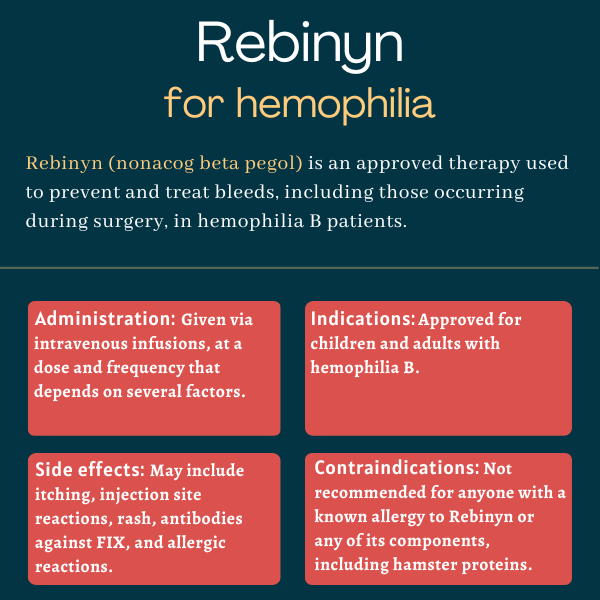Rebinyn (nonacog beta pegol) for hemophilia
What is Rebinyn for hemophilia?
Rebinyn (nonacog beta pegol, or N9-GP) is an extended half-life product approved for treating and preventing bleeds, including those occurring during surgery, in adults and children with hemophilia B.
Developed by Novo Nordisk, the therapy is administered via an infusion into the vein, or intravenously. In Europe, it’s sold under the name Refixia.
Therapy snapshot
| Brand name: | Rebinyn |
| Chemical name: | Nonacog beta pegol |
| Usage: | Preventing and treating bleeding events, including those occurring during surgery, in hemophilia B patients |
| Administration: | Intravenous infusion |
How does Rebinyn work?
Hemophilia B, an inherited disease characterized by prolonged and excessive bleeding, is caused by a missing or defective blood clotting protein, called factor IX (FIX), due to mutations in the F9 gene.
Replacement therapy, which delivers a lab-made version of the missing clotting factor directly into the bloodstream, is the mainstay treatment to control and treat bleeds in hemophilia B.
Rebinyn is such a therapy, but as an extended half-life product, the delivered FIX has been modified to last longer in the body, thereby reducing dosing frequency.
The version of FIX within Rebinyn is attached to a polyethylene glycol (PEG) molecule, in a process called PEGylation, which is known to prevent the premature breakdown of the clotting factor in the body. PEGylation also reduces FIX’s ability to trigger undesirable immune responses that may render the therapy less effective.
The medication is made in the lab using lab-grown hamster cells, so it may contain traces of hamster proteins.
Who can take Rebinyn?
Rebinyn was approved by the U.S. Food and Drug Administration (FDA) in May 2017 to control and treat bleeds — and to manage bleeds that occur in the time around surgery (perioperative period) — in both children and adults with hemophilia B.
The FDA extended Rebinyn’s approval in 2022 so it could be used as a routine preventive treatment, or prophylaxis, to prevent or reduce the frequency of bleeding episodes in the same patient population.
The European Commission approved the therapy — under the brand name Refixia — in mid-2017 as a prophylactic and on-demand treatment for bleeds, including those occurring in the perioperative period, in hemophilia B patients ages 12 and older.
Rebinyn has been available in Canada since late 2017 for on-demand use and to prevent bleeds in the perioperative period in all hemophilia B patients, and for routine prophylaxis in adults. That approval was extended by Health Canada in 2022, allowing it to be given as a routine prophylactic treatment for bleeding episodes in hemophilia B patients under age 18.
Who should not take Rebinyn?
Rebinyn is contraindicated, or not recommended, to anyone with known allergic reactions to the therapy or any of its components, including hamster proteins.
The therapy is also not indicated for inducing immune tolerance in hemophilia B patients. This means it should not be used to re-educate a patient’s immune system to cease producing neutralizing antibodies (inhibitors) against delivered clotting factors.
How is Rebinyn administered?
Rebinyn is given as an infusion directly into the bloodstream that lasts 1-4 minutes, and may be self-administered after appropriate training by a healthcare provider.
It is available as a dry white to off-white powder that must be diluted in an appropriate liquid solution, which is provided in a 4 mL pre-filled syringe.
Single-use vials are available in four strengths that are color coded:
- Red: 500 international units (IU), that after dilution provide about 125 IU per mL
- Green: 1,000 IU, that after dilution provide about 250 IU per mL
- Yellow: 2,000 IU, that after dilution provide about 500 IU per mL
- Gray: 3,000 IU, that after dilution provide about 750 IU per mL.
The treatment dosage and duration depend on the location and extent of the bleed, and the patient’s clinical condition.
The recommended dose for on-demand treatment to control bleeding episodes is a single infusion of 40 IU per kilogram of body weight (IU/kg) for minor and moderate bleeds, such as uncomplicated joint, muscle, or oral bleeds, and 80 IU/kg for major bleeds such as brain and neck bleeds. When needed, additional infusions of 40 IU/kg can be given.
For minor surgeries, such as dental procedures, a single 40 IU/kg dose before surgery may be sufficient to prevent bleeds. For major surgeries involving entrance in body cavities and organ removal, it is recommended that patients receive an 80 IU/kg infusion before surgery and additional 40 IU/kg infusions post-surgery, as clinically needed.
The recommended dose of Rebinyn for prophylaxis is 40 IU/kg once weekly.
Adjustments of doses and administration intervals may be considered for each case, based on the achieved FIX levels, bleeding tendencies, and physical activity.
The therapy may be administered at a hemophilia treatment center, at a healthcare provider’s office, or at home. Patients should learn how to administer the therapy with the help of their hemophilia treatment center or healthcare provider. Additional instructions for preparing and administering Rebinyn can be found on the treatment’s website.

Rebinyn in clinical trials
After showing promise in animal models of hemophilia B, three ascending doses of Rebinyn were initially tested in a first-in-human Phase 1 clinical trial (NCT00956345) involving 16 men with hemophilia B who previously had received FIX products.
Results showed the therapy was generally safe across all doses and that it remained in the body for longer periods than replacement therapies previously used by the patients, in a dose-dependent manner.
Rebinyn’s approvals were mainly based on data from four global Phase 3 trials: PARADIGM 2 (NCT01333111), PARADIGM 3 (NCT01386528), PARADIGM 4 (NCT01395810), and PARADIGM 5 (NCT01467427). These studies evaluated the therapy’s safety and effectiveness in routine prophylaxis, on-demand treatment, and perioperative management in more than 100 previously treated boys and men with hemophilia B.
PARADIGM 2 trial
In the PARADIGM 2 study, 74 male patients, ages 13-70, received either preventive treatment with Rebinyn — 10 or 40 IU/kg once weekly — for 52 weeks (or about one year), or on-demand treatment for 28 weeks (about six months).
Data showed that the therapy’s estimated success rate for treating bleeds was 92.2%, consistent with rates of available FIX products. Also, both prophylactic doses reduced bleeding episodes, with the 40 IU/kg dose showing meaningful efficacy.
PARADIGM 3 trial
PARADIGM 3 enrolled 13 adolescent boys and men, ages 15-56, who were undergoing major surgery. The participants received a single 80 IU/kg dose of the therapy four hours before surgery and additional infusions of 40 IU/kg after the procedure, at the investigator’s discretion.
Rebinyn safely and effectively prevented and treated bleeds in the perioperative setting, and was associated with an “excellent” or “good” bleeding-control effect in all surgeries.
PARADIGM 4 extension study
A total of 71 participants of PARADIGM 2 and 3 trials chose to enroll in the PARADIGM 4 extension study, wherein they received preventive or on-demand treatment with Rebinyn for up to two years.
Long-term treatment was shown to be associated with a favorable safety profile and a good protection against bleeds in a preventive modality, as well as in an on-demand basis.
Specifically, the success rate of Rebinyn for treating bleeds was 94.6%, with most (87.9%) being resolved with one infusion. Prophylactic treatment was associated with low annualized bleeding rates, with a deeper reduction observed with the 40 IU/kg dose. Also, perioperative outcomes were classified as “excellent’”or “good” for all 23 evaluated minor surgeries.
PARADIGM 5 trial
The ongoing PARADIGM 5 trial is assessing the 11-year safety and effectiveness of Rebinyn — given prophylactically once weekly at 40 IU/kg, and at 40 or 80 IU/kg to treat bleeds — in 25 boys, ages 1-12, with hemophilia B.
Top-line data showed one year of treatment was well tolerated and effective at preventing and treating bleeds in this younger patient population. Similar results were observed in the 17 boys who were treated for at least five years in the study, with 64% of them having experienced no bleeding episodes. Spontaneous bleeds were all mild to moderate in severity, and 93% were rapidly controlled with one or two infusions of the therapy.
Consistent with previous trials, no participant developed inhibitors, or neutralizing antibodies, against the delivered FIX, which could have rendered the therapy useless.
PARADIGM 6 trial
Another global Phase 3 study, called PARADIGM 6 (NCT02141074), tested the therapy in up to 60 previously untreated boys, up to 6 years of age, with moderately severe to severe hemophilia B. Participants received 40 IU/kg of Rebinyn prophylactically once weekly, and 40 or 80 IU/kg to treat bleeds, for up to about eight years.
Interim four-year data from 37 boys demonstrated that 67.9% of those given weekly preventive treatment had no reported bleeds and 85.7% had no spontaneous bleeds. Also, all spontaneous bleeds and 90.3% of traumatic bleeds were successfully treated.
While the therapy was generally safe, two boys developed inhibitors and were withdrawn from the study.
Common side effects of Rebinyn
The most common side effects associated with Rebinyn in previously treated patients were:
- itching
- injection site reactions, including swelling, pain, rash, or redness.
In patients not given any previous treatment, Rebinyn’s most common side effects included:
- rash
- development of FIX inhibitors
- allergic reactions, including severe reactions called anaphylaxis.
- itching
- injection site reactions.
Allergic reactions
Allergic reactions, including severe and potentially life-threatening reactions (anaphylaxis), may occur with Rebinyn. The medication contains traces of hamster proteins and it may cause allergic reactions in patients allergic to such proteins.
Patients on the therapy should be monitored for signs of an allergic reaction, such as chest tightness, wheezing, difficulty breathing, hives, itching, and/or swelling in the deeper layers of the skin or mucous membranes, especially in the period after the treatment has been started. In case of an allergic reaction, Rebinyn should be discontinued and patients should be given appropriate treatment.
Development of inhibitors
Developing inhibitors against the delivered FIX may occur during Rebinyn treatment. Levels of these neutralizing antibodies should be measured in patients not achieving expected FIX activity levels and/or bleed control with treatment.
The development of FIX inhibitors has been reported to be associated with allergic reactions. Also, patients who develop neutralizing antibodies may be at an increased risk of having severe allergic reactions after additional exposure to the supplied FIX. For this reason, patients having allergic reactions with Rebinyn should be monitored for the presence of neutralizing antibodies.
Blood clot-related events
Thromboembolic events, which occur when a blood clot breaks off and blocks a blood vessel, may occur in patients treated with FIX-containing products, such as Rebinyn. For this reason, newborns, patients with liver disease, patients who underwent surgery, and those at risk of blood clots should be monitored for early signs of these events. In each of these cases, the treatment’s benefit should be weighed against the risk of these potential complications.
Because the medication can interfere with certain blood clotting tests, FIX activity levels should be assessed with tests validated for use with Rebinyn.
Immune induction and nephrotic syndrome
Rebinyn is not indicated for immune tolerance induction, a form of treatment sometimes used to help eliminate inhibitors in people who develop neutralizing antibodies.
There have been reports of nephrotic syndrome, a condition characterized by kidney damage, developing after immune tolerance induction with FIX products like Rebinyn in people who have inhibitors. This complication often occurred in people with a history of allergic reactions to FIX. The safety and efficacy of Rebinyn for inducing immune tolerance have not been established.
Use in pregnancy and breastfeeding
It is unknown if Rebinyn can affect a developing fetus, compromise female fertility, pass to breast milk, or have harmful effects on breastfed infants or on milk production.
Patients who plan to become pregnant or breastfeed should talk with their healthcare team and only continue treatment during these periods if the potential benefit justifies the potential risks to the fetus or infant.
Hemophilia News Today is strictly a news and information website about the disease. It does not provide medical advice, diagnosis or treatment. This content is not intended to be a substitute for professional medical advice, diagnosis, or treatment. Always seek the advice of your physician or other qualified health provider with any questions you may have regarding a medical condition. Never disregard professional medical advice or delay in seeking it because of something you have read on this website.
Recent Posts
- When scars from my IV infusions lead to false assumptions
- Blood immune markers may predict ITI response in hemophilia A
- Going back to basics and finding strength on the floor
- Hympavzi lowers bleeding rates for hemophilia patients with inhibitors
- How our oldest son and hemophilia entered our lives, part 2
Related articles

 Fact-checked by
Fact-checked by 



